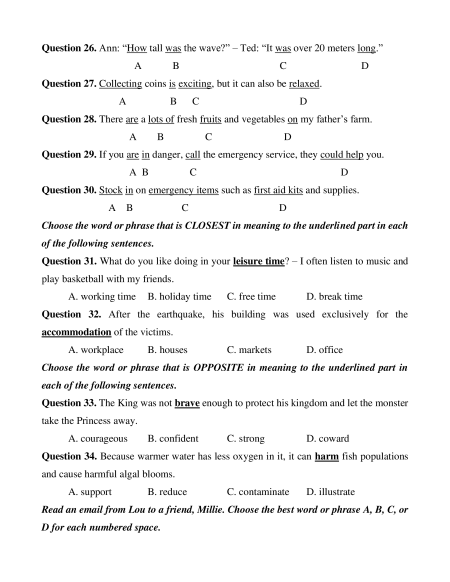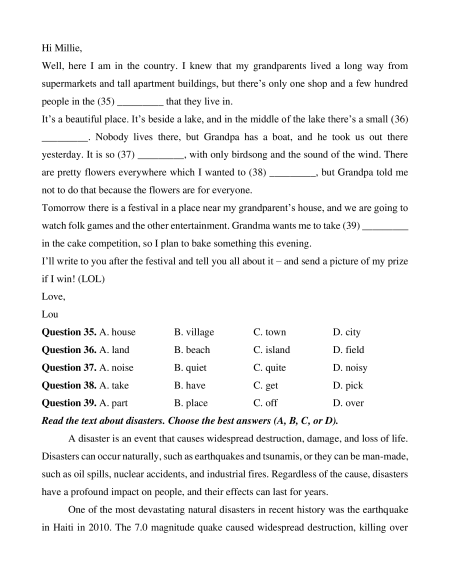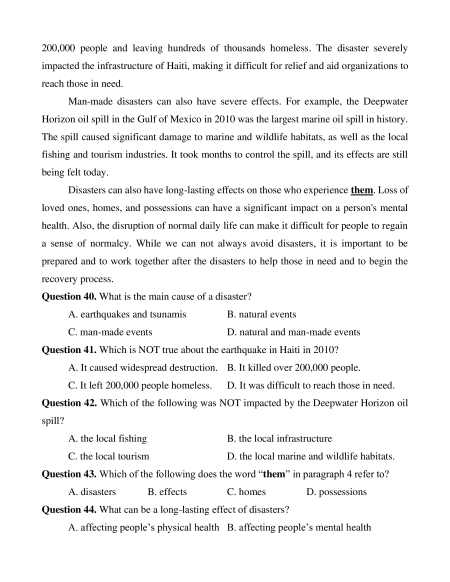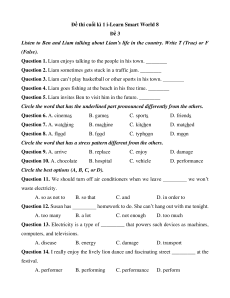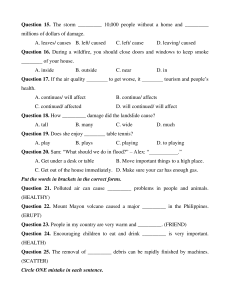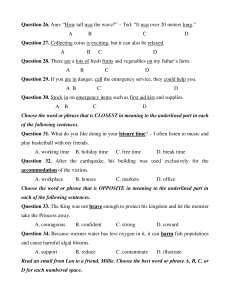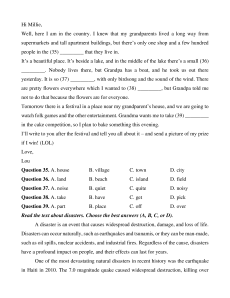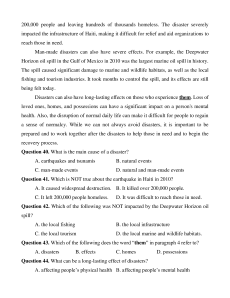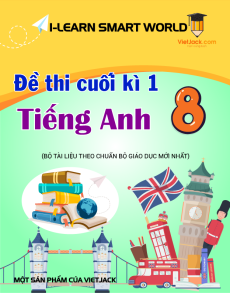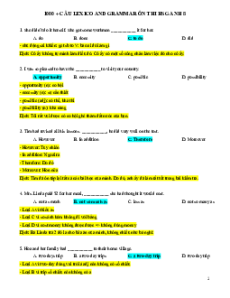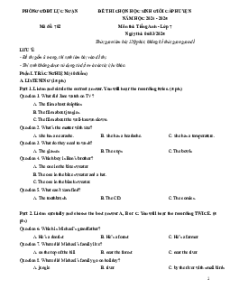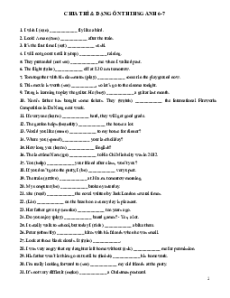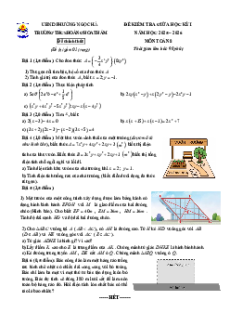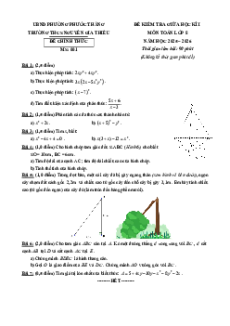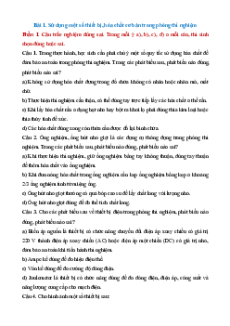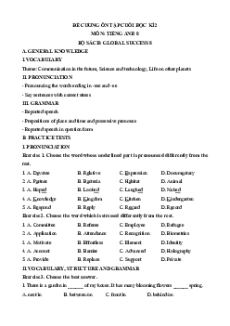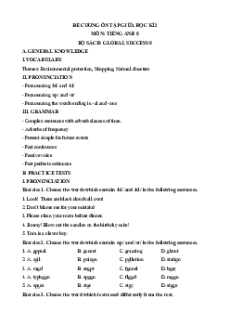Đề thi cuối kì 1 i-Learn Smart World 8 Đề 3
Listen to Ben and Liam talking about Liam’s life in the country. Write T (True) or F (False).
Question 1. Liam enjoys talking to the people in his town. ________
Question 2. Liam sometimes gets stuck in a traffic jam. ________
Question 3. Liam can’t play basketball or other sports in his town. ________
Question 4. Liam goes fishing at the beach in his free time. ________
Question 5. Liam invites Ben to visit him in the future. ________
Circle the word that has the underlined part pronounced differently from the others. Question 6. A. cinemas B. games C. sports D. friends
Question 7. A. watching B. machine C. kitchen D. matched Question 8. A. flood B. food C. typhoon D. moon
Circle the word that has a stress pattern different from the others. Question 9. A. arrive B. replace C. enjoy D. damage
Question 10. A. chocolate B. hospital C. vehicle D. performance
Circle the best options (A, B, C, or D).
Question 11. We should turn off air conditioners when we leave _________ we won’t waste electricity. A. so as not to B. so that C. and D. in order to
Question 12. Susan has _________ homework to do. She can’t hang out with me tonight. A. too many B. a lot C. not enough D. too much
Question 13. Electricity is a type of _________ that powers such devices as machines, computers, and televisions. A. disease B. energy C. damage D. transport
Question 14. I really enjoy the lively lion dance and fascinating street _________ at the festival. A. performer B. performing C. performance D. perform
Question 15. The storm _________ 10,000 people without a home and _________
millions of dollars of damage.
A. leaves/ causes B. left/ caused C. left/ cause D. leaving/ caused
Question 16. During a wildfire, you should close doors and windows to keep smoke ________ of your house. A. inside B. outside C. near D. in
Question 17. If the air quality ________ to get worse, it ________ tourism and people’s health. A. continues/ will affect B. continue/ affects C. continued/ affected
D. will continued/ will affect
Question 18. How _________ damage did the landslide cause? A. tall B. many C. wide D. much
Question 19. Does she enjoy ________ table tennis? A. play B. plays C. playing D. to playing
Question 20. Sam: “What should we do in flood?” – Alex: “___________.” A. Get under a desk or table
B. Move important things to a high place.
C. Get out of the house immediately. D. Make sure your car has enough gas.
Put the words in brackets in the correct forms.
Question 21. Polluted air can cause _________ problems in people and animals. (HEALTHY)
Question 22. Mount Mayon volcano caused a major _________ in the Philippines. (ERUPT)
Question 23. People in my country are very warm and _________. (FRIEND)
Question 24. Encouraging children to eat and drink _________ is very important. (HEALTH)
Question 25. The removal of _________ debris can be rapidly finished by machines. (SCATTER)
Circle ONE mistake in each sentence.
Question 26. Ann: “How tall was the wave?” – Ted: “It was over 20 meters long.” A B C D
Question 27. Collecting coins is exciting, but it can also be relaxed. A B C D
Question 28. There are a lots of fresh fruits and vegetables on my father’s farm. A B C D
Question 29. If you are in danger, call the emergency service, they could help you. A B C D
Question 30. Stock in on emergency items such as first aid kits and supplies. A B C D
Choose the word or phrase that is CLOSEST in meaning to the underlined part in each
of the following sentences.
Question 31. What do you like doing in your leisure time? – I often listen to music and
play basketball with my friends.
A. working time B. holiday time C. free time D. break time
Question 32. After the earthquake, his building was used exclusively for the
accommodation of the victims. A. workplace B. houses C. markets D. office
Choose the word or phrase that is OPPOSITE in meaning to the underlined part in
each of the following sentences.
Question 33. The King was not brave enough to protect his kingdom and let the monster take the Princess away. A. courageous B. confident C. strong D. coward
Question 34. Because warmer water has less oxygen in it, it can harm fish populations
and cause harmful algal blooms. A. support B. reduce C. contaminate D. illustrate
Read an email from Lou to a friend, Millie. Choose the best word or phrase A, B, C, or
D for each numbered space. Hi Millie,
Well, here I am in the country. I knew that my grandparents lived a long way from
supermarkets and tall apartment buildings, but there’s only one shop and a few hundred
people in the (35) _________ that they live in.
It’s a beautiful place. It’s beside a lake, and in the middle of the lake there’s a small (36)
_________. Nobody lives there, but Grandpa has a boat, and he took us out there
yesterday. It is so (37) _________, with only birdsong and the sound of the wind. There
are pretty flowers everywhere which I wanted to (38) _________, but Grandpa told me
not to do that because the flowers are for everyone.
Tomorrow there is a festival in a place near my grandparent’s house, and we are going to
watch folk games and the other entertainment. Grandma wants me to take (39) _________
in the cake competition, so I plan to bake something this evening.
I’ll write to you after the festival and tell you all about it – and send a picture of my prize if I win! (LOL) Love, Lou Question 35. A. house B. village C. town D. city Question 36. A. land B. beach C. island D. field Question 37. A. noise B. quiet C. quite D. noisy Question 38. A. take B. have C. get D. pick Question 39. A. part B. place C. off D. over
Read the text about disasters. Choose the best answers (A, B, C, or D).
A disaster is an event that causes widespread destruction, damage, and loss of life.
Disasters can occur naturally, such as earthquakes and tsunamis, or they can be man-made,
such as oil spills, nuclear accidents, and industrial fires. Regardless of the cause, disasters
have a profound impact on people, and their effects can last for years.
One of the most devastating natural disasters in recent history was the earthquake
in Haiti in 2010. The 7.0 magnitude quake caused widespread destruction, killing over
Đề thi cuối kì 1 Tiếng Anh 8 ilearn smart world (Đề 3 kèm file nghe)
2.1 K
1 K lượt tải
MUA NGAY ĐỂ XEM TOÀN BỘ TÀI LIỆU
CÁCH MUA:
- B1: Gửi phí vào TK:
1133836868- CT TNHH DAU TU VA DV GD VIETJACK - Ngân hàng MB (QR) - B2: Nhắn tin tới Zalo VietJack Official ( nhấn vào đây ) để xác nhận thanh toán và tải tài liệu - giáo án
Liên hệ ngay Hotline hỗ trợ: 084 283 45 85
Đề thi được cập nhật liên tục trong gói này từ nay đến hết tháng 3/2024. Chúng tôi đảm bảo đủ số lượng đề đã cam kết hoặc có thể nhiều hơn, tất cả có BẢN WORD, LỜI GIẢI CHI TIẾT và tải về dễ dàng.
Để tải tài liệu gốc về máy bạn click vào nút Tải Xuống ở trên!
Thuộc bộ (mua theo bộ để tiết kiệm hơn):
- Tailieugiaovien.com.vn giới thiệu bộ đề thi cuối kì 1 kèm file nghe Tiếng anh 8 ilearn smart world mới nhất nhằm giúp Giáo viên có thêm tài liệu tham khảo ra đề thi Tiếng anh lớp 8.
- File word có lời giải chi tiết 100%.
- Mua trọn bộ sẽ tiết kiệm hơn tải lẻ 50%.
Đánh giá
4.6 / 5(2052 )5
4
3
2
1
Trọng Bình
Tài liệu hay
Giúp ích cho tôi rất nhiều
Duy Trần
Tài liệu chuẩn
Rất thích tài liệu bên VJ soạn (bám sát chương trình dạy)
TÀI LIỆU BỘ BÁN CHẠY MÔN Tiếng Anh
Xem thêmTÀI LIỆU BỘ BÁN CHẠY Lớp 8
Xem thêmTài liệu bộ mới nhất

Đề thi cuối kì 1 i-Learn Smart World 8
Đề 3
Listen to Ben and Liam talking about Liam’s life in the country. Write T (True) or F
(False).
Question 1. Liam enjoys talking to the people in his town. ________
Question 2. Liam sometimes gets stuck in a traffic jam. ________
Question 3. Liam can’t play basketball or other sports in his town. ________
Question 4. Liam goes fishing at the beach in his free time. ________
Question 5. Liam invites Ben to visit him in the future. ________
Circle the word that has the underlined part pronounced differently from the others.
Question 6. A. cinemas B. games C. sports D. friends
Question 7. A. watching B. machine C. kitchen D. matched
Question 8. A. flood B. food C. typhoon D. moon
Circle the word that has a stress pattern different from the others.
Question 9. A. arrive B. replace C. enjoy D. damage
Question 10. A. chocolate B. hospital C. vehicle D. performance
Circle the best options (A, B, C, or D).
Question 11. We should turn off air conditioners when we leave _________ we won’t
waste electricity.
A. so as not to B. so that C. and D. in order to
Question 12. Susan has _________ homework to do. She can’t hang out with me tonight.
A. too many B. a lot C. not enough D. too much
Question 13. Electricity is a type of _________ that powers such devices as machines,
computers, and televisions.
A. disease B. energy C. damage D. transport
Question 14. I really enjoy the lively lion dance and fascinating street _________ at the
festival.
A. performer B. performing C. performance D. perform

Question 15. The storm _________ 10,000 people without a home and _________
millions of dollars of damage.
A. leaves/ causes B. left/ caused C. left/ cause D. leaving/ caused
Question 16. During a wildfire, you should close doors and windows to keep smoke
________ of your house.
A. inside B. outside C. near D. in
Question 17. If the air quality ________ to get worse, it ________ tourism and people’s
health.
A. continues/ will affect B. continue/ affects
C. continued/ affected D. will continued/ will affect
Question 18. How _________ damage did the landslide cause?
A. tall B. many C. wide D. much
Question 19. Does she enjoy ________ table tennis?
A. play B. plays C. playing D. to playing
Question 20. Sam: “What should we do in flood?” – Alex: “___________.”
A. Get under a desk or table B. Move important things to a high place.
C. Get out of the house immediately. D. Make sure your car has enough gas.
Put the words in brackets in the correct forms.
Question 21. Polluted air can cause _________ problems in people and animals.
(HEALTHY)
Question 22. Mount Mayon volcano caused a major _________ in the Philippines.
(ERUPT)
Question 23. People in my country are very warm and _________. (FRIEND)
Question 24. Encouraging children to eat and drink _________ is very important.
(HEALTH)
Question 25. The removal of _________ debris can be rapidly finished by machines.
(SCATTER)
Circle ONE mistake in each sentence.

Question 26. Ann: “How tall was the wave?” – Ted: “It was over 20 meters long.”
A B C D
Question 27. Collecting coins is exciting, but it can also be relaxed.
A B C D
Question 28. There are a lots of fresh fruits and vegetables on my father’s farm.
A B C D
Question 29. If you are in danger, call the emergency service, they could help you.
A B C D
Question 30. Stock in on emergency items such as first aid kits and supplies.
A B C D
Choose the word or phrase that is CLOSEST in meaning to the underlined part in each
of the following sentences.
Question 31. What do you like doing in your leisure time? – I often listen to music and
play basketball with my friends.
A. working time B. holiday time C. free time D. break time
Question 32. After the earthquake, his building was used exclusively for the
accommodation of the victims.
A. workplace B. houses C. markets D. office
Choose the word or phrase that is OPPOSITE in meaning to the underlined part in
each of the following sentences.
Question 33. The King was not brave enough to protect his kingdom and let the monster
take the Princess away.
A. courageous B. confident C. strong D. coward
Question 34. Because warmer water has less oxygen in it, it can harm fish populations
and cause harmful algal blooms.
A. support B. reduce C. contaminate D. illustrate
Read an email from Lou to a friend, Millie. Choose the best word or phrase A, B, C, or
D for each numbered space.
Hi Millie,
Well, here I am in the country. I knew that my grandparents lived a long way from
supermarkets and tall apartment buildings, but there’s only one shop and a few hundred
people in the (35) _________ that they live in.
It’s a beautiful place. It’s beside a lake, and in the middle of the lake there’s a small (36)
_________. Nobody lives there, but Grandpa has a boat, and he took us out there
yesterday. It is so (37) _________, with only birdsong and the sound of the wind. There
are pretty flowers everywhere which I wanted to (38) _________, but Grandpa told me
not to do that because the flowers are for everyone.
Tomorrow there is a festival in a place near my grandparent’s house, and we are going to
watch folk games and the other entertainment. Grandma wants me to take (39) _________
in the cake competition, so I plan to bake something this evening.
I’ll write to you after the festival and tell you all about it – and send a picture of my prize
if I win! (LOL)
Love,
Lou
Question 35. A. house B. village C. town D. city
Question 36. A. land B. beach C. island D. field
Question 37. A. noise B. quiet C. quite D. noisy
Question 38. A. take B. have C. get D. pick
Question 39. A. part B. place C. off D. over
Read the text about disasters. Choose the best answers (A, B, C, or D).
A disaster is an event that causes widespread destruction, damage, and loss of life.
Disasters can occur naturally, such as earthquakes and tsunamis, or they can be man-made,
such as oil spills, nuclear accidents, and industrial fires. Regardless of the cause, disasters
have a profound impact on people, and their effects can last for years.
One of the most devastating natural disasters in recent history was the earthquake
in Haiti in 2010. The 7.0 magnitude quake caused widespread destruction, killing over

200,000 people and leaving hundreds of thousands homeless. The disaster severely
impacted the infrastructure of Haiti, making it difficult for relief and aid organizations to
reach those in need.
Man-made disasters can also have severe effects. For example, the Deepwater
Horizon oil spill in the Gulf of Mexico in 2010 was the largest marine oil spill in history.
The spill caused significant damage to marine and wildlife habitats, as well as the local
fishing and tourism industries. It took months to control the spill, and its effects are still
being felt today.
Disasters can also have long-lasting effects on those who experience them. Loss of
loved ones, homes, and possessions can have a significant impact on a person's mental
health. Also, the disruption of normal daily life can make it difficult for people to regain
a sense of normalcy. While we can not always avoid disasters, it is important to be
prepared and to work together after the disasters to help those in need and to begin the
recovery process.
Question 40. What is the main cause of a disaster?
A. earthquakes and tsunamis B. natural events
C. man-made events D. natural and man-made events
Question 41. Which is NOT true about the earthquake in Haiti in 2010?
A. It caused widespread destruction. B. It killed over 200,000 people.
C. It left 200,000 people homeless. D. It was difficult to reach those in need.
Question 42. Which of the following was NOT impacted by the Deepwater Horizon oil
spill?
A. the local fishing B. the local infrastructure
C. the local tourism D. the local marine and wildlife habitats.
Question 43. Which of the following does the word “them” in paragraph 4 refer to?
A. disasters B. effects C. homes D. possessions
Question 44. What can be a long-lasting effect of disasters?
A. affecting people’s physical health B. affecting people’s mental health

C. increasing sense of normalcy D. slowing down the recovery process
Complete these sentences.
Question 45. She only allows her children to watch television at weekends.
→ She only lets ________________________________________________.
Question 46. We should recycle trash. We can reduce land pollution. (SO THAT)
→ ___________________________________________________________.
Question 47. These eruptions have lasted from a few hours to 145 days. (Make a question
for the underlined part.)
→ ___________________________________________________________?
Reorder the words to make full sentences.
Question 48. a/ Friday/ by/ 6.9/ Indonesia/ magnitude/ was/ earthquake/ powerful/ on/
struck/ .
→ ___________________________________________________________.
Question 49. our time/ is/ one/ most/ of/ problems/ serious/ Water pollution/ the/ of/
environmental/ .
→ ___________________________________________________________.
Question 50. swimming/ the/ parents/ enjoy/ My/ in/ sea./ really
→ ___________________________________________________________.
ĐÁP ÁN VÀ LỜI GIẢI:
Listen to Ben and Liam talking about Liam’s life in the country. Write T (True) or F
(False).
Question 1.
Hướng dẫn giải:
Đáp án đúng: T
Thông tin: Liam: Well, a lot. The country is beautiful, and the people here are friendly
and helpful. I love talking to them. (Ồ, rất nhiều. Ở nông thôn rất đẹp và người dân ở đây
rất thân thiện và hay giúp đỡ. Tôi thích nói chuyện với họ.)
Dịch: Liam thích nói chuyện với người dân trong thị trấn của mình.

Question 2.
Hướng dẫn giải:
Đáp án đúng: F
Thông tin: Liam: There aren't a lot of vehicles here, so traffic jams are rare. You never see
yourself get stuck in a traffic jam. (Ở đây không có nhiều xe cộ nên hiếm khi xảy ra ùn
tắc giao thông. Bạn sẽ không bao giờ bị kẹt xe đâu.)
Dịch: Liam thỉnh thoảng bị kẹt xe.
Question 3.
Hướng dẫn giải:
Đáp án đúng: T
Thông tin: Liam: … There's not much entertainment in my town. There aren't many sports
facilities, either. That makes it difficult for me to practice basketball and other sports.
(…Thị trấn của tôi không có nhiều trò giải trí. Cũng không có nhiều cơ sở thể thao. Điều
đó gây khó khăn cho tôi khi tập luyện bóng rổ và các môn thể thao khác.)
Dịch: Liam không thể chơi bóng rổ hoặc các môn thể thao khác ở thị trấn của anh ấy.
Question 4.
Hướng dẫn giải:
Đáp án đúng: F
Thông tin: Liam: I'm living near the sea, so my cousins and I often go there for beach
games. We sometimes collect starfish on the beach, too. There are lots of them here. (Tôi
sống gần biển nên tôi và anh em họ thường đến đó chơi các trò chơi trên bãi biển. Đôi khi
chúng tôi cũng thu thập sao biển trên bãi biển. Có rất nhiều sao biển ở đây.)
Dịch: Liam đi câu cá ở bãi biển vào thời gian rảnh rỗi.
Question 5.
Hướng dẫn giải:
Đáp án đúng: T
Thông tin:

Liam: Yes, it is. And how about visiting me here? (Đúng vậy. Bạn sẽ đến đây thăm tôi
chứ?)
Ben: That's a great idea! (Đó là một ý tưởng tuyệt vời!)
Dịch: Liam mời Ben đến thăm mình trong tương lai.
Nội dung bài nghe:
Ben: Hey, Liam! How's it going in the country?
Liam: Hi, Ben. Everything is great!
Ben: Great! How do you like it?
Liam: Well, a lot. The country is beautiful, and the people here are friendly and helpful. I
love talking to them.
Ben: That's terrific! What else do you like about the country, Liam?
Liam: I think that's the air. It's fresh!
Ben: What about traffic jams?
Liam: There aren't a lot of vehicles here, so traffic jams are rare. You never see yourself
get stuck in a traffic jam.
Ben: That sounds great! How about cinemas?
Liam: Well, They're not common here. There's not much entertainment in my town. There
aren't many sports facilities, either. That makes it difficult for me to practice basketball
and other sports.
Ben: So what do you do for fun?
Liam: I'm living near the sea, so my cousins and I often go there for beach games. We
sometimes collect starfish on the beach, too. There are lots of them here.
Ben: Wow, that's awesome!
Liam: Yes, it is. And how about visiting me here?
Ben: That's a great idea!
Dịch bài nghe:
Ben: Này, Liam! Tình hình ở quê thế nào rồi?
Liam: Chào Ben. Mọi thứ đều tuyệt vời!

Ben: Tuyệt vời! Bạn thích nó như thế nào?
Liam: Ồ, rất nhiều. Ở nông thôn rất đẹp và người dân ở đây rất thân thiện và hay giúp đỡ.
Tôi thích nói chuyện với họ.
Ben: Thật tuyệt vời! Bạn còn thích điều gì khác ở vùng quê này không, Liam?
Liam: Tôi nghĩ đó là không khí. Nó rất trong lành!
Ben: Thế còn kẹt xe thì sao?
Liam: Ở đây không có nhiều xe cộ nên hiếm khi xảy ra ùn tắc giao thông. Bạn sẽ không
bao giờ bị kẹt xe đâu.
Ben: Nghe tuyệt đấy! Còn rạp chiếu phim thì sao?
Liam: Ồ, chúng không phổ biến ở đây. Thị trấn của tôi không có nhiều trò giải trí. Cũng
không có nhiều cơ sở thể thao. Điều đó gây khó khăn cho tôi khi tập luyện bóng rổ và các
môn thể thao khác.
Ben: Vậy bạn làm gì để giải trí?
Liam: Tôi sống gần biển nên tôi và anh em họ thường đến đó chơi các trò chơi trên bãi
biển. Đôi khi chúng tôi cũng thu thập sao biển trên bãi biển. Có rất nhiều sao biển ở đây.
Ben: Wow, thật tuyệt vời!
Liam: Đúng vậy. Bạn sẽ đến đây thăm tôi chứ?
Ben: Đó là một ý tưởng tuyệt vời!
Circle the word that has the underlined part pronounced differently from the others.
Question 6.
Hướng dẫn giải:
Đáp án đúng: C
Đáp án C có phần gạch chân được phát âm là /s/, các đáp án còn lại phần gạch chân được
phát âm là /z/.
Question 7.
Hướng dẫn giải:
Đáp án đúng: B

Đáp án B có phần gạch chân được phát âm là /ʃ/, các đáp án còn lại phần gạch chân được
phát âm là /tʃ/.
Question 8.
Hướng dẫn giải:
Đáp án đúng: A
Đáp án A có phần gạch chân được phát âm là /ʌ/, các đáp án còn lại phần gạch chân được
phát âm là /uː/.
Circle the word that has a stress pattern different from the others.
Question 9.
Hướng dẫn giải:
Đáp án đúng: D
Đáp án D có trọng âm rơi vào âm tiết thứ 1, các đáp án còn lại có trọng âm rơi vào âm tiết
thứ 2.
Question 10.
Hướng dẫn giải:
Đáp án đúng: D
Đáp án D có trọng âm rơi vào âm tiết thứ 2, các đáp án còn lại có trọng âm rơi vào âm tiết
thứ 1.
Circle the best options (A, B, C, or D).
Question 11.
Hướng dẫn giải:
Đáp án đúng: B
so that + clause = so as to + V-inf = in order to + V-inf = in order that + clause: để…
and: và
Dịch: Chúng ta nên tắt điều hòa khi rời đi để tránh lãng phí điện.
Question 12.
Hướng dẫn giải:
Đáp án đúng: D

too much + N không đếm được: quá nhiều
too many + N đếm được số nhiều
a lot of + N đếm được/ không đếm được
enough + N: đủ
Dịch: Susan có quá nhiều bài tập về nhà cần làm. Cô ấy không thể đi chơi cùng tôi tối
nay.
Question 13.
Hướng dẫn giải:
Đáp án đúng: B
energy (n): năng lượng
disease (n): bệnh tật
damage (n): thiệt hại
transport (n): phương tiện đi lại
Dịch: Điện là 1 dạng năng lượng cung cấp năng lượng cho các thiết bị như máy móc, máy
tính và tivi.
Question 14.
Hướng dẫn giải:
Đáp án đúng: C
performance (n): màn trình diễn
performer (n): người trình diễn
perform (v): trình diễn
Dịch: Tôi thực sự thích thú với màn múa lân sôi động và màn trình diễn đường phố hấp
dẫn tại lễ hội.
Question 15.
Hướng dẫn giải:
Đáp án đúng: B
Đây là câu kể lại các sự việc đã diễn ra và kết thúc trong quá khứ → dùng thì quá khứ đơn

Dịch: Cơn bão đã khiến cho 10.000 người mất đi nhà cửa và gây thiệt hại hàng triệu đô
la.
Question 16.
Hướng dẫn giải:
Đáp án đúng: B
outside (prep): bên ngoài
inside (prep): bên trong
near (prep): ở gần
in (prep): bên trong
Dịch: Khi xảy ra hỏa hoạn, bạn nên đóng các cửa ra vào và cửa sổ lại để giữ khói không
vào nhà.
Question 17.
Hướng dẫn giải:
Đáp án đúng: A
Câu điều kiện loại 1 (có thật ở hiện tại):
If + S + V (HTĐ) + O, S + will/can + V-inf + O.
Dịch: Nếu chất lượng không khí tiếp tục xuống cấp thì sẽ ảnh hưởng tới du lịch và sức
khỏe của con người.
Question 18.
Hướng dẫn giải:
Đáp án đúng: D
How much + N không đếm được: Có bao nhiêu
How tall: Hỏi về chiều cao
How many + N đếm được số nhiều: Có bao nhiêu
How wide: Hỏi về chiều rộng
Dịch: Trận sạt lở đất đã gây ra bao nhiêu thiệt hại?
Question 19.
Hướng dẫn giải:

Đáp án đúng: C
enjoy doing sth: thích làm gì
Dịch: Cô ấy thích chơi bóng bàn có phải không?
Question 20.
Hướng dẫn giải:
Đáp án đúng: B
A. Chui xuống gầm bàn.
B. Di chuyển các đồ vật quan trọng lên chỗ cao.
C. Ra khỏi nhà ngay lập tức.
D. Đảm bảo xe bạn đủ xăng.
Dịch: Sam: “Chúng ta nên làm gì khi có lũ lụt?” – Alex: “Di chuyển các đồ vật quan trọng
lên chỗ cao.”
Put the words in brackets in the correct forms.
Question 21.
Hướng dẫn giải:
Đáp án đúng: health
healthy (adj): tốt cho sức khỏe, lành mạnh
health problems: các vấn đề về sức khỏe
Dịch: Không khi ô nhiễm có thể gây ra các vấn đề về sức khỏe cho con người và động
vật.
Question 22.
Hướng dẫn giải:
Đáp án đúng: eruption
Sau tính từ “major” ta cần 1 danh từ.
erupt (v): phun trào → eruption (n): sự phun trào
Dịch: Núi lửa núi Mayon đã gây ra vụ phun trào lớn ở Philippines.
Question 23.
Hướng dẫn giải:

Đáp án đúng: friendly
Liên từ “and” nối 2 từ đồng loại. “warm” là tính từ nên chỗ cần điền cũng cần 1 tính từ.
friend (n): bạn → friendly (adj): thân thiện
Dịch: Người dân ở nước tôi rất ấm áp và thân thiện.
Question 24.
Hướng dẫn giải:
Đáp án đúng: healthily
Ta cần 1 trạng từ để bổ sung nghĩa cho động từ thường “eat and drink”.
health (n): sức khỏe → healthily (adv): lành mạnh
Dịch: Khuyến khích trẻ em ăn uống lành mạnh là rất quan trọng.
Question 25.
Hướng dẫn giải:
Đáp án đúng: scattered
Trước danh từ “debris” ta cần 1 tính từ để bổ sung nghĩa cho nó.
scatter (n): sự phân tán → scattered (adj): rải rác, lác đác
Dịch: Việc loại bỏ các mảnh vụn rải rác có thể được thực hiện nhanh chóng bằng máy
móc.
Circle ONE mistake in each sentence.
Question 26.
Hướng dẫn giải:
Đáp án đúng: D
Hỏi và trả lời về chiều cao: How tall + be + S? → It + be + chiều cao + tall.
Sửa thành: tall
Dịch: Ann: “Cơn sóng cao bao nhiêu?” – Ted: “Nó cao hơn 20m.”
Question 27.
Hướng dẫn giải:
Đáp án đúng: D
Tính từ đuôi –ed dùng để mô tả cảm xúc của con người đối với sự vật, hiện tượng khác.

Tính từ đuôi –ing dùng để chỉ đặc điểm, tính chất của sự vật, hiện tượng hoặc tính cách
con người.
Sửa thành: relaxing
Dịch: Thu thập đồng xu rất thú vị, nhưng nó cũng cỏ thể thoải mái.
Question 28.
Hướng dẫn giải:
Đáp án đúng: B
lots of/ a lot of + N đếm được/ không đếm được
Sửa thành: lot of
Dịch: Có nhiều rau củ quả tươi sạch trên nông trại của bố tôi.
Question 29.
Hướng dẫn giải:
Đáp án đúng: D
Câu điều kiện loại 1 (có thật ở hiện tại):
If + S + V (HTĐ) + O, S + will/can + V-inf + O.
Sửa thành: will help
Dịch: Nếu bạn gặp nguy hiểm, hãy gọi cấp cứu, họ sẽ giúp bạn.
Question 30.
Hướng dẫn giải:
Đáp án đúng: B
stock up: dự trữ, cất vào kho
Sửa thành: up
Dịch: Dự trữ các vật dụng khẩn cấp như bộ dụng cụ sơ cứu và đồ dự trữ.
Choose the word or phrase that is CLOSEST in meaning to the underlined part in each
of the following sentences.
Question 31.
Hướng dẫn giải:
Đáp án đúng: B

leisure time (n) = free time (n): thời gian rảnh rỗi
working time: thời gian làm việc
holiday time: thời gian nghỉ
break time: giờ giải lao
Dịch: Bạn thích làm gì vào thời gian rảnh? – Tôi thường nghe nhạc và chơi bóng rổ với
bạn bè.
Question 32.
Hướng dẫn giải:
Đáp án đúng: B
accommodation (n): chỗ ở = houses (n): nhà ở
workplace (n): nơi làm việc
markets (n): chợ
office (n): văn phòng
Dịch: Sau trận động đất, tòa nhà của ông được dùng riêng làm nơi ở cho các nạn nhân.
Choose the word or phrase that is OPPOSITE in meaning to the underlined part in
each of the following sentences.
Question 33.
Hướng dẫn giải:
Đáp án đúng: D
brave (adj): dũng cảm >< coward (adj): nhát gan
courageous (adj): can đảm
confident (adj): tự tin
strong (adj): mạnh mẽ
Dịch: Vị vua đã không đủ dũng cảm để bảo vệ vương quốc của mình và để quái vật bắt
mất công chúa đi.
Question 34.
Hướng dẫn giải:
Đáp án đúng: A

harm (v): gây hại >< support (v): hỗ trợ, giúp đỡ
reduce (v): làm giảm
contaminate (v): gây ô nhiễm
illustrate (v): minh họa
Dịch: Bởi vì nước ấm hơn có ít oxy hơn nên nó có thể gây hại cho quần thể cá và gây ra
hiện tượng tảo nở hoa có hại.
Read an email from Lou to a friend, Millie. Choose the best word or phrase A, B, C, or
D for each numbered space.
Question 35.
Hướng dẫn giải:
Đáp án đúng: B
a long way from supermarkets and tall apartment buildings: cách xa các siêu thị và các
tòa nhà chung cư cao → city.
city (thành phố) >< village (ngôi làng − làng quê)
house (n): ngôi nhà
town (n): thị trấn
city (n): thành phố
Dịch: Tôi biết rằng ông bà tôi sống rất xa các siêu thị và khu chung cư cao tầng nhưng chỉ
có một cửa hàng và vài trăm người trong ngôi làng mà họ sinh sống.
Question 36.
Hướng dẫn giải:
Đáp án đúng: A
small land: bãi đất nhỏ
beach (n): bãi biển
island (n): hòn đảo
field (n): cánh đồng
Dịch: Đó là một nơi tuyệt đẹp. Nó nằm cạnh một cái hồ, giữa hồ có một bãi đất nhỏ.
Question 37.

Hướng dẫn giải:
Đáp án đúng: B
quiet (adj): yên tĩnh
noise (n): tiếng ồn
quite: khá (dùng để nhấn mạnh)
noisy (adj): ồn ào
Dịch: Thật yên tĩnh, chỉ có tiếng chim hót và tiếng gió.
Question 38.
Hướng dẫn giải:
Đáp án đúng: D
pick (v): hái (hoa)
Dịch: Ở đâu cũng có hoa đẹp mà tôi muốn hái nhưng ông nội bảo tôi đừng làm vậy vì hoa
là dành cho tất cả mọi người.
Question 39.
Hướng dẫn giải:
Đáp án đúng: A
take part in: tham gia vào
Dịch: Bà muốn tôi tham gia cuộc thi làm bánh nên tôi dự định sẽ nướng món gì đó vào tối
nay.
Dịch bài đọc:
Chào Millie,
Tôi đang ở vùng nông thôn. Tôi biết rằng ông bà tôi sống rất xa các siêu thị và khu chung
cư cao tầng nhưng chỉ có một cửa hàng và vài trăm người trong ngôi làng mà họ sinh
sống.
Đó là một nơi tuyệt đẹp. Nó nằm cạnh một cái hồ, giữa hồ có một bãi đất nhỏ. Không có
ai sống ở đó, nhưng ông nội có một chiếc thuyền và ông đã đưa chúng tôi ra đó ngày hôm
qua. Thật yên tĩnh, chỉ có tiếng chim hót và tiếng gió. Ở đâu cũng có hoa đẹp mà tôi muốn
hái nhưng ông nội bảo tôi đừng làm vậy vì hoa là dành cho tất cả mọi người.

Ngày mai có lễ hội ở một nơi gần nhà ông bà tôi và chúng tôi sẽ xem các trò chơi dân gian
và các trò giải trí khác. Bà muốn tôi tham gia cuộc thi làm bánh nên tôi dự định sẽ nướng
món gì đó vào tối nay.
Tôi sẽ viết thư cho bạn sau lễ hội và kể cho bạn nghe tất cả về nó – đồng thời gửi ảnh giải
thưởng của tôi nếu tôi thắng! (CƯỜI)
Yêu,
Lou
Read the text about disasters. Choose the best answers (A, B, C, or D).
Question 40.
Hướng dẫn giải:
Đáp án đúng: D
Dịch: Nguyên nhân chính gây ra thảm họa là gì?
A. động đất và sóng thần B. các hiện tượng tự nhiên
C. các sự kiện do con người tạo ra D. các sự kiện tự nhiên và nhân tạo
Thông tin: Disasters can occur naturally, such as earthquakes and tsunamis, or they can
be man-made, such as oil spills, nuclear accidents, and industrial fires. Regardless of the
cause, disasters have a profound impact on people, and their effects can last for years.
(Thảm họa có thể xảy ra một cách tự nhiên như động đất và sóng thần hoặc có thể do con
người gây ra như tràn dầu, tai nạn hạt nhân và cháy công nghiệp. Bất kể nguyên nhân là
gì, thảm họa đều có tác động sâu sắc đến con người và ảnh hưởng của chúng có thể kéo
dài nhiều năm.)
Question 41.
Hướng dẫn giải:
Đáp án đúng: C
Dịch: Câu nào KHÔNG đúng về trận động đất ở Haiti năm 2010?
A. Nó gây ra sự tàn phá trên diện rộng.
B. Nó đã giết chết hơn 200.000 người.
C. Nó khiến 200.000 người mất nhà cửa.

D. Thật khó để tiếp cận những người gặp khó khăn.
Thông tin: One of the most devastating natural disasters in recent history was the
earthquake in Haiti in 2010. The 7.0 magnitude quake caused widespread destruction,
killing over 200,000 people and leaving hundreds of thousands homeless. The disaster
severely impacted the infrastructure of Haiti, making it difficult for relief and aid
organizations to reach those in need. (Một trong những thảm họa thiên nhiên tàn khốc
nhất trong lịch sử gần đây là trận động đất ở Haiti năm 2010. Trận động đất mạnh 7,0 độ
richter đã gây ra sức tàn phá trên diện rộng, giết chết hơn 200.000 người và khiến hàng
trăm nghìn người mất nhà cửa. Thảm họa đã ảnh hưởng nghiêm trọng đến cơ sở hạ tầng
của Haiti, khiến các tổ chức cứu trợ và viện trợ gặp khó khăn trong việc tiếp cận những
người gặp khó khăn.)
Question 42.
Hướng dẫn giải:
Đáp án đúng: B
Dịch: Điều nào sau đây KHÔNG bị ảnh hưởng bởi vụ tràn dầu Deepwater Horizon?
A. đánh cá địa phương
B. cơ sở hạ tầng địa phương
C. du lịch địa phương
D. môi trường sống dưới biển và môi trường sống hoang dã địa phương.
Thông tin: Man-made disasters can also have severe effects. For example, the Deepwater
Horizon oil spill in the Gulf of Mexico in 2010 was the largest marine oil spill in history.
The spill caused significant damage to marine and wildlife habitats, as well as the local
fishing and tourism industries. (Thảm họa do con người gây ra cũng có thể gây ra hậu quả
nghiêm trọng. Ví dụ, vụ tràn dầu Deepwater Horizon ở Vịnh Mexico năm 2010 là vụ tràn
dầu biển lớn nhất trong lịch sử. Vụ tràn dầu đã gây ra thiệt hại đáng kể cho môi trường
sống dưới biển và môi trường sống hoang dã cũng như ngành đánh bắt cá và du lịch địa
phương.)
Question 43.

Hướng dẫn giải:
Đáp án đúng: A
Dịch: Từ “them” ở đoạn 4 ám chỉ từ nào sau đây?
A. thảm họa B. ảnh hưởng C. nhà cửa D. tài sản
Thông tin: Disasters can also have long-lasting effects on those who experience them.
(Thảm họa cũng có thể để lại những ảnh hưởng lâu dài đối với những người trải qua
chúng.)
Question 44.
Hướng dẫn giải:
Đáp án đúng: B
Dịch: Hậu quả lâu dài của thiên tai là gì?
A. ảnh hưởng đến sức khỏe thể chất của con người
B. ảnh hưởng đến sức khỏe tinh thần của con người
C. tăng cảm giác bình thường
D. làm chậm quá trình phục hồi
Thông tin: Disasters can also have long-lasting effects on those who experience them.
Loss of loved ones, homes, and possessions can have a significant impact on a person's
mental health. Also, the disruption of normal daily life can make it difficult for people to
regain a sense of normalcy. While we cannot always avoid disasters, it is important to be
prepared and to work together after the disasters to help those in need and to begin the
recovery process. (Thảm họa cũng có thể để lại những ảnh hưởng lâu dài đối với những
người trải qua chúng. Mất đi người thân, nhà cửa, tài sản có thể tác động đáng kể đến sức
khỏe tinh thần của một người. Ngoài ra, sự gián đoạn của cuộc sống bình thường hàng
ngày có thể khiến mọi người khó lấy lại cảm giác bình thường. Mặc dù không phải lúc
nào chúng ta cũng có thể tránh được thảm họa, nhưng điều quan trọng là phải chuẩn bị và
hợp tác sau thảm họa để giúp đỡ những người gặp khó khăn và bắt đầu quá trình phục
hồi.)
Dịch bài đọc:

Thảm họa là một sự kiện gây ra sự tàn phá, thiệt hại và thiệt mạng trên diện rộng.
Thảm họa có thể xảy ra một cách tự nhiên như động đất và sóng thần hoặc có thể do con
người gây ra như tràn dầu, tai nạn hạt nhân và cháy công nghiệp. Bất kể nguyên nhân là
gì, thảm họa đều có tác động sâu sắc đến con người và ảnh hưởng của chúng có thể kéo
dài nhiều năm.
Một trong những thảm họa thiên nhiên tàn khốc nhất trong lịch sử gần đây là trận
động đất ở Haiti năm 2010. Trận động đất mạnh 7,0 độ richter đã gây ra sức tàn phá trên
diện rộng, giết chết hơn 200.000 người và khiến hàng trăm nghìn người mất nhà cửa.
Thảm họa đã ảnh hưởng nghiêm trọng đến cơ sở hạ tầng của Haiti, khiến các tổ chức cứu
trợ và viện trợ gặp khó khăn trong việc tiếp cận những người gặp khó khăn.
Thảm họa do con người gây ra cũng có thể gây ra hậu quả nghiêm trọng. Ví dụ, vụ
tràn dầu Deepwater Horizon ở Vịnh Mexico năm 2010 là vụ tràn dầu biển lớn nhất trong
lịch sử. Vụ tràn dầu đã gây ra thiệt hại đáng kể cho môi trường sống dưới biển và môi
trường sống hoang dã cũng như ngành đánh bắt cá và du lịch địa phương. Phải mất nhiều
tháng để kiểm soát sự cố tràn dầu và ảnh hưởng của nó vẫn còn hiện hữu cho đến ngày
nay.
Thảm họa cũng có thể để lại những ảnh hưởng lâu dài đối với những người trải qua
chúng. Mất đi người thân, nhà cửa, tài sản có thể tác động đáng kể đến sức khỏe tinh thần
của một người. Ngoài ra, sự gián đoạn của cuộc sống bình thường hàng ngày có thể khiến
mọi người khó lấy lại cảm giác bình thường. Mặc dù không phải lúc nào chúng ta cũng
có thể tránh được thảm họa, nhưng điều quan trọng là phải chuẩn bị và hợp tác sau thảm
họa để giúp đỡ những người gặp khó khăn và bắt đầu quá trình phục hồi.
Complete these sentences.
Question 45.
Hướng dẫn giải:
Đáp án đúng: She only lets her children watch television at weekends.
allow ab to do sth = let sb do sth: cho phép ai làm gì
Dịch: Cô ấy chỉ cho phép con mình xem tivi vào cuối tuần.

Question 46.
Hướng dẫn giải:
Đáp án đúng: We should recycle trash so that we can reduce land pollution.
so that + clause: để…
Dịch: Chúng ta nên tái chế rác để có thể làm giảm ô nhiễm đất.
Question 47.
Hướng dẫn giải:
Đáp án đúng: How long have these eruptions lasted?
How long: Bao lâu, hỏi về khoảng thời gian
Dịch: Những vụ phun trào này kéo dài từ vài giờ đến 145 ngày. = Những vụ phun trào
này kéo dài bao lâu?
Reorder the words to make full sentences.
Question 48.
Hướng dẫn giải:
Đáp án đúng: Indonesia was struck by a powerful magnitude 6.9 earthquake on
Friday.
be stuck by: bị tấn công bởi
Dịch: Indonesia đã phải hứng chịu trận động đất mạnh 6,9 độ richter hôm thứ Sáu.
Question 49.
Hướng dẫn giải:
Đáp án đúng: Water pollution is one of the most serious environmental problems of
our time.
one of the most + adj dài + N(s/es): một trong những…nhất
Dịch: Ô nhiễm nước là một trong những vấn đề môi trường nghiêm trọng nhất của thời
đại chúng ta.
Question 50.
Hướng dẫn giải:
Đáp án đúng: My parents really enjoy swimming in the sea.

enjoy doing sth: thích làm gì
Dịch: Bố mẹ tôi thực sự thích bơi ở biển.


